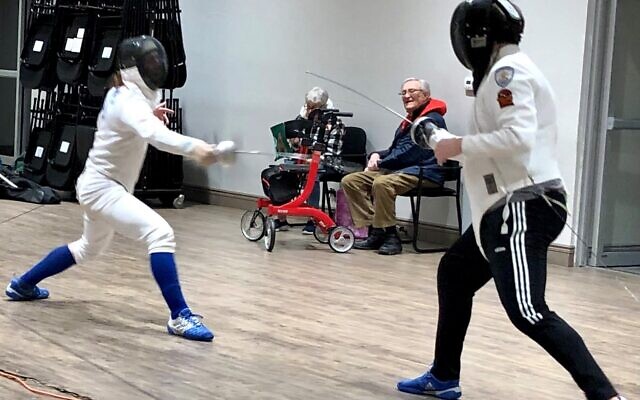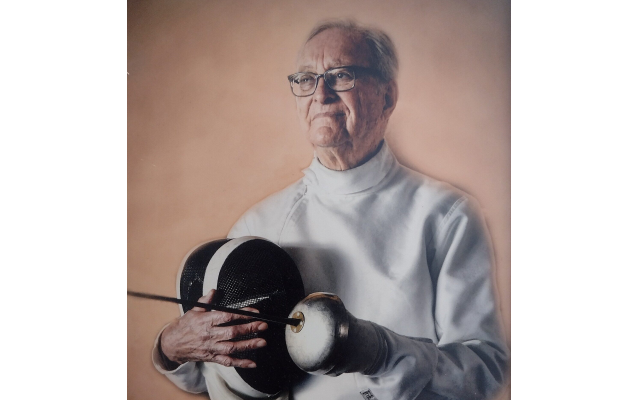Singing Senior Also a Fencing Master
Ira Levy, who performs bi-monthly at Huntcliff Summit where he resides, still longs for competitive fencing.
The first thing Ira Levy will show you when you step into his apartment at Huntcliff Summit is his music room, where he keeps a stand with printed music and a keyboard — which he moves aside to get to the closet. Inside, there are over half a dozen blades, mostly epees and foils, which are still in good condition despite being obviously well-used. Levy shows them, as well as several of his medals, trophies, and other fencing memorabilia, as he describes how he got started at the sport.
When he was around 15, and injured from a high jumping accident, he got to witness a cousin of his fencing in the street near his home. He decided the moment he saw it that as soon as he was feeling better, he wanted to fence.
He started fencing foil both in New York’s Public School Athletic League (PSAL), and under the tutelage of Maestro Giorgio Santelli, at his New York club. Because of this level of commitment, he excelled at the PSAL, meeting every weekend at Washington Irving High School.
“I don’t think I lost a bout,” he chuckled.

He attended NYU after high school, where he fenced for their foil squad under coach Julio M. Costello — but his fencing career was briefly interrupted when World War II broke out and he volunteered for the Army. Between taking part in a number of vital battles in the war — including storming the beach at Normandy — and performing during R&R — including venues such as Verdun Opera House — Levy found he had very little time to practice bladework.
“That’s a blur!” he joked, eager to discuss fencing again.
When he returned from the war, he met his future wife, Arlene. The two, who have now been married 75 years, settled down to start a family — but this didn’t slow Ira Levy’s fencing in the slightest.
What could have been the peak of Ira Levy’s career came in 1952, when Santelli invited him to come train for the Olympic team.
“If I went, I’d have to go for a month. My boss said to me — my uncle — ‘Enjoy it, but you won’t have your job when you come back.’”

As he was married with two kids, and this being before the time that Olympic athletes were actually paid for their performance, the choice was simple. But Ira Levy had the last laugh.
“When all these guys [Olympians] came back there was a three-weapon championship,” Ira Levy said, “I beat every one of them. Every one. I didn’t lose a bout.”
Ira tried to share his passion with the rest of his family, with little luck. Arlene Levy had tried fencing briefly in college, and decided it wasn’t for her. The Levy’s son tried fencing at around 14 years old but stopped shortly after.
“One guy said to Howard, ‘Boy, you’re just like your father,’” said Ira Levy, “and that was the kiss of death.”
He was, however, able to impart his love of music to his son; two-time Grammy-award-winning pianist/harmonica player Howard Levy still finds time to join a few of his father’s bi-monthly singing performances at Huntcliff.
Ira Levy continued fencing foil into his 70s, when the Levy’s were involved in a terrible accident.
“A drunken kid driving on the Marine Parkway Bridge crossed lanes, smashed into the front, landed on the top, and crushed the car with us in it,” Arlene Levy recounted.
Afterwards, Ira couldn’t lift his right arm high enough to fence. Undeterred, he trained to fence left-handed, utilizing entirely different stances/techniques than he had spent most of his career learning. It took him close to three months, but it meant he could keep fencing. And keep fencing he did, even after moving to Florida, and switching to primarily fencing epee — a different blade, with different rules, than he had tended to use for the last 60 years of his fencing career. The oldest veteran’s league at the time was 70-plus, and Ira Levy continued to beat fencers who were soon 10 or 20 years his junior, well into his 90s.
Now 101 years old, although his left hand can still easily hold and use a blade, mobility issues have made it too difficult for Ira Levy to move up and down the piste. But just because he’s no longer fencing himself, doesn’t mean he’s no longer involved. In February, he visited Dunwoody Fencing Club, immersing himself in the world of fencing again, and taking the chance to offer younger fencers a healthy dose of inspiration and advice.
“You got to have that mentality that goes with your fencing. It’s a lot of work. And you will improve as your opponents improve,” said Ira Levy, speaking from experience. “You should always fence against a better opponent — what you consider a better opponent. You learn from that.”




comments